 MyDogBreeds
MyDogBreeds Black and Tan Coonhound is originated from United States but Anatolian Shepherd is originated from Turkey. Black and Tan Coonhound may grow 7 cm / 2 inches shorter than Anatolian Shepherd. Black and Tan Coonhound may weigh 34 kg / 74 pounds lesser than Anatolian Shepherd. Both Black and Tan Coonhound and Anatolian Shepherd has almost same life span. Both Black and Tan Coonhound and Anatolian Shepherd has same litter size. Both Black and Tan Coonhound and Anatolian Shepherd requires Moderate maintenance.
Black and Tan Coonhound is originated from United States but Anatolian Shepherd is originated from Turkey. Black and Tan Coonhound may grow 7 cm / 2 inches shorter than Anatolian Shepherd. Black and Tan Coonhound may weigh 34 kg / 74 pounds lesser than Anatolian Shepherd. Both Black and Tan Coonhound and Anatolian Shepherd has almost same life span. Both Black and Tan Coonhound and Anatolian Shepherd has same litter size. Both Black and Tan Coonhound and Anatolian Shepherd requires Moderate maintenance.
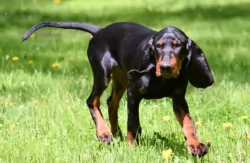 Descendent of the English Talbot Hound, the Black and Tann Coonhound is nevertheless an American creation. Developed by crossing the Black and Tan Virginia Foxhound with the Bloodhound in the very early years of the American experience. It is said that George Washington owned several. The very first Coonhound that was given American Kennel Club registration was the Black and Tan in 1945. They had been admitted to the United Kennel Club in 1912. The Black and Tan Coonhound is a traditional hunting dog – known by hunters as a “trail and tree hound”. This is a dog that finds its prey and trees it. They have incredibly strong instincts to hunt and need to hunt. They can track their prey for miles and if they have a scent you cannot get their attention back. They have been valued because they can “cold track”, following the scent of an animal that left the scene long ago. They are known to have tracked mountain lions and bears as well as deer and coon. They were developed to keep the American settlers safe and well fed, but also to keep them company on the trails or by the fireplace. They are the American Dog.
Descendent of the English Talbot Hound, the Black and Tann Coonhound is nevertheless an American creation. Developed by crossing the Black and Tan Virginia Foxhound with the Bloodhound in the very early years of the American experience. It is said that George Washington owned several. The very first Coonhound that was given American Kennel Club registration was the Black and Tan in 1945. They had been admitted to the United Kennel Club in 1912. The Black and Tan Coonhound is a traditional hunting dog – known by hunters as a “trail and tree hound”. This is a dog that finds its prey and trees it. They have incredibly strong instincts to hunt and need to hunt. They can track their prey for miles and if they have a scent you cannot get their attention back. They have been valued because they can “cold track”, following the scent of an animal that left the scene long ago. They are known to have tracked mountain lions and bears as well as deer and coon. They were developed to keep the American settlers safe and well fed, but also to keep them company on the trails or by the fireplace. They are the American Dog.
 Up in the mountains of central Turkey, in the region called Anatolia, a large, strong and rugged dog breed was born and is honored today on a postal stamp. This was the Anatolian Shepard – keeper of the flocks with strength, agility and speed. The Anatolian Shepard is able to pursue and catch any predator that threatens his livestock and they are his livestock. His keen sense of hearing and his excellent sight only add to his prowess as a protector.
Up in the mountains of central Turkey, in the region called Anatolia, a large, strong and rugged dog breed was born and is honored today on a postal stamp. This was the Anatolian Shepard – keeper of the flocks with strength, agility and speed. The Anatolian Shepard is able to pursue and catch any predator that threatens his livestock and they are his livestock. His keen sense of hearing and his excellent sight only add to his prowess as a protector.
The Anatolian is a giant dog, classified as a shepherd by the UKC – Kennel Club of the United Kingdom, while he is classified as a mountain dog or molossus by the Federation Cynologique International. When the breed was created, they were a gift to the farmers in the mountains to guard the livestock from cheetahs. This helped the cheetahs to stop attacking the livestock and prevented the farmers from wiping out the cheetah population by shooting them.
The Anatolian Shepard does have some controversy in his lineage as in some areas he is considered to be either the most closely related or the same breed as the Turkish Kangal Dog. The Anatolian is considered to have a blood line that goes back at least 6000 years.
They are direct descendants of mastiffs and mountain dogs. Yet they have the long legs, agility and aloofness of the sight hounds that are also in their bloodline. Originally called the “Coban Kopegi” or shepherd dog by their Turkish farmers, they were eventually separated into the breed called the Anatolian Shepard. When the breed was first brought into the United Kingdom the line of the Kangal dog was first. Then they were crossed with dogs called Anatolian Shepherds. Many breeders believe that the Anatolian Shepherd is a category that includes the Kangal, Coban Kopegi, Aksaray Malaklisi and the Akbash dog.
So as of January 2012, the Australian National Kennel Club no longer considers the Anatolian Shepard and the Kangal as separate breeds. The UK Kennel Club now recognizes the Kangal and the Anatolian as the same breed. For others they are still clearly separate and distinct breeds with the ASD being their own breed. In fact, the government of Turkey recognizes them as separate breeds and the Kangal Dog as the National Dog of Turkey.
The Anatolian Shepard was already in the United States in when the Anatolian Shepard Club of America came into being because of a young naval officer who had met the dogs in Turkey. They were allowed into the Miscellaneous Class of the American Kennel Club in 1996 after this naval officer had been breeding them in California for years. By 1998 they had moved to the Working Group where they reside today.
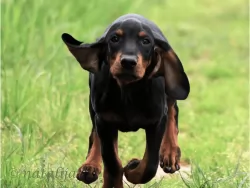 The Black and Tan Coonhound looks like we all imagine a coonhound would look. They have strong and muscular legs, an oval skull and a scissors bite. They have brown or hazel eyes that are very expressive. The ears of course are long like the bloodhound, far back on the head and thin. His nose is amazingly sensitive as he is scent hound. His nostrils are always black. He is a large, strong dog.
The Black and Tan Coonhound looks like we all imagine a coonhound would look. They have strong and muscular legs, an oval skull and a scissors bite. They have brown or hazel eyes that are very expressive. The ears of course are long like the bloodhound, far back on the head and thin. His nose is amazingly sensitive as he is scent hound. His nostrils are always black. He is a large, strong dog.
 Coming from the mountains and guarding their flock against cheetahs has led the Anatolian Shepherd to be a muscular dog with broad heads and thick necks and sturdy, strong bodies. Their ears drop and are triangular in shape, while their muzzles are rectangular with tight lips. Their double coat is thick and warm fitting for life in the mountain regions. They do blow their coats with excessive shedding twice a year. The fur on their throat is extra thick for their protection.
Coming from the mountains and guarding their flock against cheetahs has led the Anatolian Shepherd to be a muscular dog with broad heads and thick necks and sturdy, strong bodies. Their ears drop and are triangular in shape, while their muzzles are rectangular with tight lips. Their double coat is thick and warm fitting for life in the mountain regions. They do blow their coats with excessive shedding twice a year. The fur on their throat is extra thick for their protection.
Muscular, thin, their rib cage is large while their stomach is small. Their tails can be intact or docked. The Anatolian Shepherd is much like the Kuvasz or the Great Pyrenees in their size, shape and responsibilities. He is more agile and slenderer than those two dogs. Their bite is scissors or level, while their eyes are almonds, set apart in their heads.
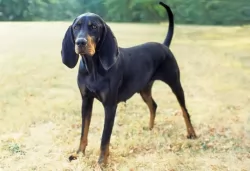 The Black and Tan Coonhound is intelligent, calm, affectionate, independent, strong, and stubborn. They love children and are gentle with them, but they are also very independent and may not do what the child wants them to do in play. They are loyal to their family and will bay at strangers. They are incredibly adaptable and happy-go-lucky. They will end up on the couch or bed so don’t try to fight it. They like cars and enjoy traveling. If you get a BTC be ready for that booming voice.
The Black and Tan Coonhound is intelligent, calm, affectionate, independent, strong, and stubborn. They love children and are gentle with them, but they are also very independent and may not do what the child wants them to do in play. They are loyal to their family and will bay at strangers. They are incredibly adaptable and happy-go-lucky. They will end up on the couch or bed so don’t try to fight it. They like cars and enjoy traveling. If you get a BTC be ready for that booming voice.
 This breed is independent, stubborn and strong. They are great protectors of their flocks and people, but they are incredibly challenging to own. They are intelligent, loyal dogs who learn quickly when they want to. They key being “when they want to”. The Anatolian Shepard was bred to be nomadic, following the herd and hunting for the herd’s predators. Microchip your ASD because they will roam if they get the chance.
This breed is independent, stubborn and strong. They are great protectors of their flocks and people, but they are incredibly challenging to own. They are intelligent, loyal dogs who learn quickly when they want to. They key being “when they want to”. The Anatolian Shepard was bred to be nomadic, following the herd and hunting for the herd’s predators. Microchip your ASD because they will roam if they get the chance.
If you want your Anatolian to get along with other dogs, cats or other animals, socialize them together when the ASD is a puppy. If the animal or child is part of his flock the ASD will protect them with his life. Though he is loving, quiet and calm, the Anatolian is just as demanding and dominating. Never let your Anatolian Shepherd believe that he is above the humans in the pack or you will have a major problem controlling him. He will be especially leery of strangers and will not accept your word that the stranger is part of the family. However, if she understands that humans are above her and you are the leader, she will accept any person you accept.
Even if they accept strangers, they will not allow anyone other than the family into the home when the owner is not there. This is a proud, proud dog that can be stubborn, demanding and bossy. Being such a large dog, you need to be in control. This is not a dog for everyone. Be firm, confident, be loving and consistent when training an Anatolian Shepherd. Do not offer your ASD any additional training in protection. He doesn’t need it and it could be detrimental. They will protect children, but they do not respect them. Therefore, supervise their interactions with children.
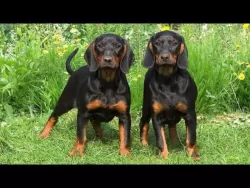 his is a very healthy breed but like any long eared, floppy eared dogs are prone to ear infections and more seriously ear cancer. They can acquire hip dysplasia like any larger dog and they can have eye issues as well.
his is a very healthy breed but like any long eared, floppy eared dogs are prone to ear infections and more seriously ear cancer. They can acquire hip dysplasia like any larger dog and they can have eye issues as well.
 This is a healthy breed without a lot of the issues that plaque other giant breeds. In one recent survey the leading cause of death among the ASD is cancer and old age. Skin issues are more prevalent than dysplasia though it does occur. They have a sensitivity to anesthesia and their immune system does take longer to mature so all young ASD should be discussed with vets before any vaccinations are given. Bloat is not as common among this breed either. They should be screened for eyelid inversion or entropion. They are susceptible to Demodectic Mange or demodicosis which is caused by a mite.
This is a healthy breed without a lot of the issues that plaque other giant breeds. In one recent survey the leading cause of death among the ASD is cancer and old age. Skin issues are more prevalent than dysplasia though it does occur. They have a sensitivity to anesthesia and their immune system does take longer to mature so all young ASD should be discussed with vets before any vaccinations are given. Bloat is not as common among this breed either. They should be screened for eyelid inversion or entropion. They are susceptible to Demodectic Mange or demodicosis which is caused by a mite.
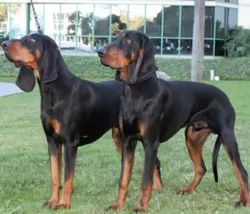 This coonhound is a big, rugged, working dog and needs to be fed accordingly. Feed him at least twice a day in smaller portions and not right before or right after exercise. Don’t send him on a hunt with a full stomach. Don’t overfeed.
This coonhound is a big, rugged, working dog and needs to be fed accordingly. Feed him at least twice a day in smaller portions and not right before or right after exercise. Don’t send him on a hunt with a full stomach. Don’t overfeed.
Not that the Black and Tan Coonhound is lazy, but he can be a couch potato when he is not working. He needs moderate exercise everyday and he does well at activities like barn hunt and field games. If he does catch a scent outdoors and he is not confined in a fence, he will follow the scent with no attention to your calls at all. He can run for miles on end when pursuing prey, but he’d also enjoy just jogging along side you or your bike. He loves long walks but make sure he is on a leash and can’t follow his nose.
 Feed your Anatolian Shepherd a measured amount twice a day and keep him from becoming overweight. It is recommended that you feed her from 4-6 cups of dry, high quality food for the entire day. The more active your dog is, the more she will need to eat. Using treats in training is appropriate but don’t give her too many as these will add to the waist line.
Feed your Anatolian Shepherd a measured amount twice a day and keep him from becoming overweight. It is recommended that you feed her from 4-6 cups of dry, high quality food for the entire day. The more active your dog is, the more she will need to eat. Using treats in training is appropriate but don’t give her too many as these will add to the waist line.
As mentioned previously this is a very healthy breed especially when compared with other giant and/or mountain dog breeds. However, they are susceptible but not prone to:
Should be tested for this condition in which the bones don’t fit well into the joint. Elbow Dysplasia – the same as above except it is the arm bone does not fit well into the joint. Both these conditions can cause arthritis or lameness.
Caused by mites and a weakened immune system it can result in patches of scaly, red skin and hair loss. A generalized version can cover the entire body and can be fatal.
This can result if obesity, hair loss, epilepsy, lethargy and other skin condition. It is easily treatable.
Mentioned previously it causes the eyelid to roll inward and requires surgery.
Your Anatolian Shepherd does not need a lot of exercise despite his size. A large yard with a good fence will do for him as long as he gets a walk daily. If they can run free in a large yard they will be happy. If not, you will need to take them to a dog park, preferable when other dogs are NOT present. You can’t assume he will be ok with other dogs. Never walk them off leash as they love to wander. They need a job to do.